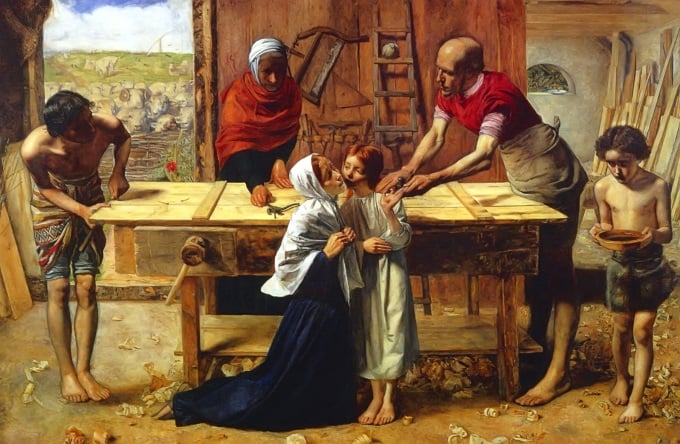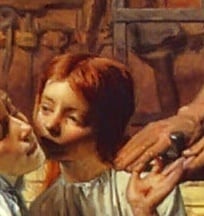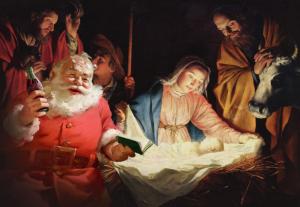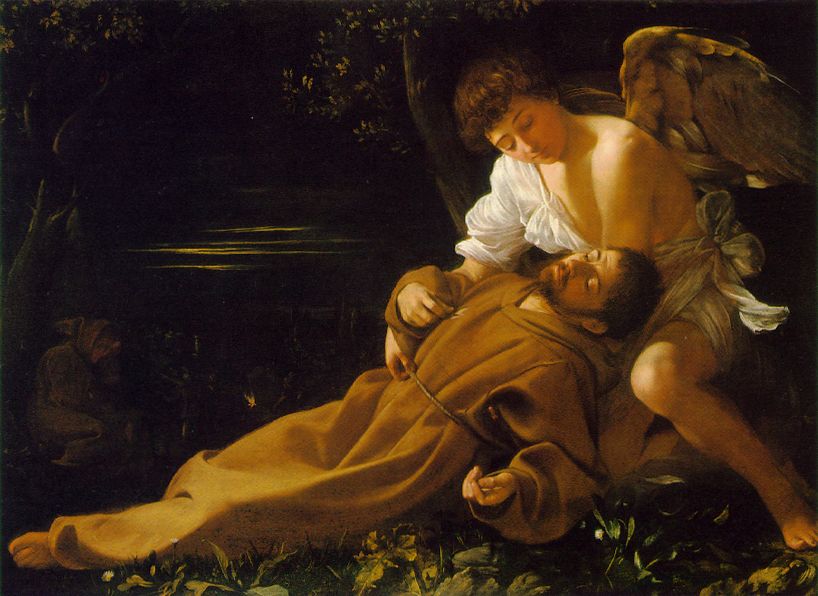
Sir. John Everett Millais
In the magic of the Christmas story, let’s not forget the one who paid the bills
by Wendy Murray
In the rush and sentimentality of Christmas, the seeming ubiquitous chorus “ `round yon virgin, Mother and Child” makes it is easy to forget that two individuals became parents of the Son of God that improbable night. Mary is rendered the greater distinction, conceiving without having been with a man and holding so many things in heart. But Joseph deserves credit too, because —miraculous conception aside — he is the one who took charge, paid the bills and acted on dreams.
Joseph was an ordinary man. He worked in a wood shop measuring beams and shaving edges, hammering, dusting, buffing — working hard, making things.
He loved a young Jewish girl, probably in her mid-teens as was standard in that day. In accordance with Jewish law, they became betrothed, that is, pledged in marriage. In those days, betrothal carried with it all the privileges and responsibilities of marriage, with the exception of sexual union. This part had to wait until after a special ceremony at which time the man would take the woman to his home and they would consummate the marriage.
You can imagine, then, the shock and shame Joseph would have felt to learn that his virginal bride was pregnant. The gospel writer Matthew says “she was found to be with child,” which implies that Mary might have kept the news to herself until the pregnancy became too obvious to hide.
Joseph knew that he had never had sexual relations with Mary, following Jewish law, and so concluded — as any dejected husband would —that Mary had had sexual relations with someone else. He knew also that he had to divorce Mary, since adultery was a vile violation of religious law. He could have had her stoned, or at least publicly humiliated. But he chose instead to “divorce her quietly” since (as Matthew also notes) “he was a righteous man and did not want to expose her to public disgrace.”
Then Joseph had a dream. In the dream he saw the appearance of an angel who instructed him: “Do not be afraid to take Mary home as your wife.” Matthew attests that when Joseph awoke “he did what the angel of the Lord had commanded him and took Mary into his home as his wife.” In other words, they got married.
Even after the ceremony when that big moment arrived, equally anticipated and dreaded, Mary’s condition precluded standard marital protocols. “He had no union with her until she gave birth to a son.”
After their marriage, the newlyweds traveled to the small village under orders of Caesar Augustus who had ordered a census. Each head-of-family had to register in his hometown, which, for Joseph, was Bethlehem.
I’m guessing her water broke while traveling on the mule and the necessity for shelter overthrew all other contingencies. But Bethlehem was busy that night because of families, like Joseph’s, that had arrived for the census. All doors were shut to them, that is until a kind soul saw their predicament and gave them a private place out back, in a barn with fresh hay and a feeding trough. There they would lay their newborn, who came, ready or not, while cows and sheep dispassionately chewed the cud.
The Christmas story should not underestimate the significance of Joseph in this improbable narrative. He displayed magnanimity to a woman whom he had thought had violated the sacred betrothal. He looked out for her welfare and desired to spare her shame, though he himself was the aggrieved party (so he thought). We learn elsewhere in the gospels, that he taught his (adopted) son his trade of carpentry and he must have been good at it since later in the gospels Jesus is known as “the carpenter’s son.” As Jesus himself would eventually assume that mantle, it is evident that Joseph spent many hours in the wood shop teaching his son how to plane a board and measure an angle. They probably spent many long hours working on projects side-by-side until the angles and edges were just so.
Let it also not be overlooked that Joseph, among his other honorable qualities, not only saw angels but gave heed to their words. This singular quality in this otherwise well-grounded man ought to cause us to pause. How many of us, if we saw an angel, would recognize it as such? And, recognizing, how many of us would make life-altering decisions based upon this visitation? Perhaps angels don’t visit as much in these modern times because we have hardened ourselves against believing they exist, much less interact. Maybe God speaks to us through angels (or other means) only in equal measure to our predisposition to believe what we are seeing. Maybe we do not see angels anymore because we are not looking for them. This logic in reverse suggests then that Joseph was visited by angels because he was predisposed to believe and courageous enough to act.
The only other thing we know about Joseph is that he did not live to see his oldest son reach the pinnacle of his public ministry. Joseph never knew that his little helper in the wood shop would become the healer of the blind and a famed teacher on the Mount. He did not live to see his son take little ones in his arms (as he himself would have taken his son), or debate Pharisees about the nature of true religion, or receive the tear-soaked gesture of the prostitute. Joseph was not there to console his wife, Mary, when she watched their son drag a beam to a hill for the purpose of dying on it.

Sir. John Everett Millais
This ordinary man knew of none of this. He simply obeyed the angel who told him to take Mary and raise the child she was carrying. He did his job, raising his family, loving his wife, teaching his son, listening to angels.











